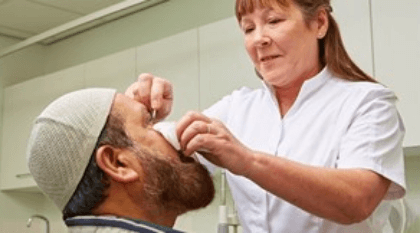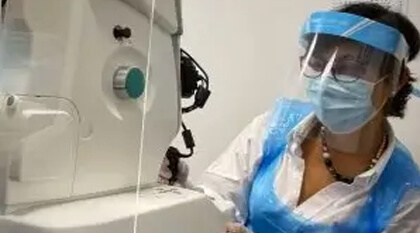
*** From 1st April 2025, the provider of the Surrey Diabetic Eye Screening Programme has changed. To contact the new Surrey Programme please call the Patient Engagement Centre on 01483 359060 ***
The Surrey diabetic eye screening programme is an innovative and diverse service that is truly tailored to its population.
The importance of diabetic eye screening
If you are living with diabetes it is vital that you get an annual check for diabetic retinopathy. This condition can lead to sight loss if not detected early and treated and, as a diabetic patient over 12, you are entitled to a routine screening appointment.
How does it work?
Your screening appointment in 6 easy steps:

Your history
We will check and confirm your details before we start.

Testing Visual Acuity
In other words, we test how good your sight is. If you wear glasses please bring them to your appointment.

Dilation Drops
These eye drops make your pupils larger to ensure the images we capture are clear. The eye drops can cause blurriness and sensitivity to light for up to 6 hours – do not drive in this time. Please see below.

Photographing the eye
We then use an advanced camera system to photograph different areas of the back of your eye.

Grading your eyes
The images of your eyes will be assessed after your appointment.

Results
You will usually receive your results 4 – 6 weeks after the appointment.
Your Appointment

Your Appointment
When attending your appointment please bring the following with you:
- Please bring your current distance glasses – these are the pair you wear to watch TV or drive.
- Details of diabetes treatment – diet control, tablets, insulin.
- Details of any other eye conditions and any treatment you’ve had/are having at hospital.
- Sunglasses can help reduce glare and may make exiting the appointment more comfortable.
You are permitted to bring someone with you to your appointment but space at some of our venues is limited, so please keep chaperones to a minimum.
We would ask you to allow at least an hour for the appointment.
Venues and transport to your appointment

Venues and transport to your appointment
Venues
Since the COVID-19 outbreak, due to the increased risk of infection to people with diabetes and staff, we are unable to return to many of the local GP surgeries we used before the pandemic. This means you may not get offered an appointment at your usual venue. Please accept our apologies for the inconvenience and be assured that the new venue will be the closest we can offer, and will have more choice of appointment dates and times and be near to bus routes from many localities.
Transport to your appointment
We recommend you do not drive to your eye screening appointment as your pupils will be dilated to enable us to take photographs of the back of the eye, and this causes blurred vision for up to 6 hours afterwards. If you cannot use public transport and have no friends or family available to bring you, you may be able to arrange for volunteer transport.
Unfortunately NEC Care cannot book transport for any people who require transport. If you require help to get to an appointment, please let the administration team know so an appropriate appointment can be made for you. To arrange transport to clinics under the Surrey programme patients need to telephone Surrey Transport direct on
0300 123 9840
Allow a minimum of 2 weeks notice and their appointment must be between 10am and 12pm
The Dilation Eye Drops

The Dilation Eye Drops
We will test your eyes using Minims Tropicamide 1.0% eye drops. In some situations some services may also use Phenylephrine 2.5% OR Cyclopentalate 1%. Leaflets about the drops are available at all screening appointments. It’s extremely rare, but you may experience a reaction to these drops. If you – or the person you’re caring for – have any of the following symptoms, contact your local A&E department.
- severe eye pain
- nausea and vomiting
- severe headache
- blurred vision and seeing halos around lights
- profuse eye watering.
The eye drops we’ve used last for six hours. If your vision has not returned to normal after 6 hours you should seek medical assistance.
Do not drive or operate heavy machinery during this time as the drops used at the screening appointments are designed to widen your pupils (dilation). Dilation can temporarily affect your vision, and you may not be able to read to the required legal distance. Driving under the influence of the drops may also invalidate your insurance whilst the drug is in your system. Please try to avoid driving following your screening appointment.
The drops may cause a small stinging sensation in your eyes. This will last for a few seconds only. It is similar to getting some soap in your eye.
We would always recommend dilation as the drops allow the screeners to take clear images of your retina, ensuring sight threatening changes are not missed. If you have concerns about the dilation drops, please discuss this with the screener at your appointment. You may be required to have another appointment.
Pregnancy

Pregnancy
If you have diabetes and become pregnant, you will need special care as there are risks to both mother and baby associated with the condition.
You’ll be offered additional tests for diabetic retinopathy at or soon after your first antenatal clinic visit, and also after 28 weeks of pregnancy as pregnancy can speed up progression of diabetic retinopathy
If the early stages of retinopathy are found at the first screening, you will also be offered another test between 16 and 20 weeks of pregnancy.
If serious retinopathy is found at any screening, you will be referred to an eye specialist. Some women who do not have diabetes can develop hyperglycaemia (high blood sugar) during pregnancy. This is known as gestational diabetes.
Pregnant women who develop gestational diabetes are not offered screening for diabetic retinopathy.
There is no evidence to suggest dilation drops are harmful to you or your baby, so we will still offer dilation drops. You may, however, wish to opt out of the use of dilation drops during pregnancy. This can be discussed with the screener at your appointment.
If you are pregnant, and we have not invited you for screening, please contact us as soon as possible to make an appointment.
For more information about diabetes and pregnancy please visit NHS Choices.
Disabilities

Disabilities
Living with a physical disability?
Do you have everything you need to come to an eye screening appointment with us? All our screening venues are accessible for people using wheelchairs, and many have the hearing loop system, where you see this logo.

Our friendly staff will do what they can to help you on arrival or call 01483 671 300 in advance for specific help.
Living with a learning disability?
Do you or someone you support have learning disabilities that make attending appointments difficult? Would you like help to make coming to eye screening easier?
Please get in touch so that we can work with you on your needs – we can provide familiarisation sessions or other aids to make eye screening as safe and easy as possible.
Tel: 01483 671 300 to discuss.
FAQs
Retinal screening is an important part of diabetes care. Diabetes can affect the small blood vessels at the back of your eye, the retina. The effects of diabetic retinopathy can lead to damage to your eyesight if left untreated. Regular eye screening will check your retina for any signs of diabetic retinopathy and help manage any follow requirements that may be needed. It is important to keep your eye screening appointments when invited.
At your eye screening appointment, one of our highly trained retinal screeners will take photographs of the back of your eyes and check for any signs of diabetic retinopathy.
When you arrive at your screening appointment, please make yourself known to the screener or follow instructions at the location to find the screening room.
The screener will call you into the screening room when ready for your appointment, introduce themselves and check consent for the screening process.
The screener will then ask some questions regarding any relevant medical history that will help understand individual needs for ongoing care.
You will be asked to undertake a quick visual check by reading letters off a chart.
At this point of the appointment, the screener will place some drops into your eyes. This will dilate your pupils to allow for the photographs to be taken.
Once you are comfortable, the screener will ask you to take a seat outside for around 20 minutes while the drops take effect.
The screener will invite you back into the room, after the 20 minutes and will ask you to sit in front of the retinal camera.
A minimum of 2 photographs of each eye will be taken by the screener. The photographs do not hurt; however there will be a bright flash from the camera.
When all the images have been captured that are required, the screener will explain what will happen next and when to expect your results.
In some cases, you may be asked to attend more frequently. Some examples are below for why we are reinviting you for screening.
- If the images captured at your appointment are not clear, another appointment will be made for you to reattempt photography. This can happen if the dilation drops did not work well enough or drops have not been used at the appointment. Please attend the new appointment.
- Some eye conditions, such as cataracts, may prevent photographs from being captured. You will be invited for a Slit Lamp appointment. A different piece of equipment will be used to examine the back of your eye which may be able to see your retina.
- We may want to monitor your retina on a more frequent basis. If this is the case we will invite you to a Digital Surveillance clinic. The process may be very similar to your normal appointment checks, but we may take more photographs more regularly. We may invite you to one of these clinics if there is diabetic retinopathy that we want to monitor for progression but does not require hospital treatment.
- If you are pregnant we will invite you more frequently throughout your pregnancy to monitor your retina. See the further details about screening during pregnancy.
Standard intervals between screening are yearly. Due to the COVID-19 pandemic, some appointments may be delayed. Please see our questions specifically regarding the COVID-19 pandemic and how we are managing your appointments.
Many high street opticians are able to take images of your eye for a charge, but may not be part of the National Screening Service. Therefore your test will not be recognised as part of the screening service. High street opticians will check your vision, so it is important to keep both your opticians and your retinal screening appointments.
The effects of diabetes on the small blood vessels around your body can take time to appear.
Changes to your diet and lifestyle may have reduced your HbA1c to a “Diabetes Resolved” level, which is fantastic, but to ensure your eyesight is protected we will continue to offer you screening.
We would always encourage you to take up invitations for your retinal screening when you are invited, but we understand that sometimes now might not be the best time to attend and there may be a more convenient time for you. Changes to your appointment can be made by contacting our central administration team.
Postponing your appointment
If right now isn’t a convenient time to attend, and you need to reschedule for a few months time, the admin team may offer to postpone your appointment. This will temporarily change the period that you will be invited for screening. Once the period has ended another appointment will be sent to you.
Opting Out
Every person with diabetes has the right to decide to attend screening. You may wish to opt out of screening. If this is the case the administration team will discuss the options with you and send you a form to complete. It is important that the form is returned and signed. If a form is not returned invitations will continue. In line with National Guidelines you have the right to opt out of screening for 1,2 or 3 years. As this is a serious decision and could affect your vision, please discuss any options with your GP before opting out of screening.
If you have chosen to postpone or opt out of screening for any length of time the administration team can invite you sooner. Please let us know if you would like to be invited.
Sometimes the ability to complete the screening appointment can be affected by other medical conditions that our service users may have. This may require a Medical Exclusion to be completed.
In all instances, screening will be offered until further details are understood. We will contact and consult with the GP or medical professional to seek a signed form.
In most circumstances, we encourage attendance to attempt screening. There are a few things that need to be considered for a successful screening.
- Is the person able to give verbal consent/understand the procedure?
- If a person needs assistance to understand or consent we would ask someone to accompany them to an appointment.
- Is the person able to sit up and support themselves at our equipment?
- Retinal cameras require someone to be able to place their chin onto rest and sit forward for a few moments. If someone is bed bound or unable to sit forward, screening is unlikely to be successful. In these situations we would require a medical exclusion.
- Someone has a terminal condition.
- We would seek a medical exclusion and suspend invitations.
If you are a carer with lasting power of attorney for medical reasons and want to make changes for someone’s screening invitations, we will ask for a copy of this certification
Attending screening in another programme can be arranged. It may be more suitable for you to attend in another programme than the one registered for your primary care. In these situations we will require notification for yourself and consent to inform the new screening service and your registered GP.
Once consent has been received by the new programme and GP you will be invited by the new programme.
We will request annual updates from the screening service to ensure continuity of care.
Results from screening can be confusing, but they don’t have to be. You will be sent results from screening typically within a few weeks of attending.
Retinopathy has classified stages of results that help explain what has been seen in your images: Results are given an “R” grade and an “M” grade. Below are the possible outcomes from your screening appointment and an explanation of what they mean.
No Retinopathy
There has been no signs of diabetic retinopathy in either eye at this screening. You will be invited for another screening when you are next due. No action needed.
Background Retinopathy
Some small changes to the small blood vessels (capillaries) have been seen in your eyes. This can be one single area of change to several areas. These changes will not affect your vision. Progression may be very minor and slow and annual screening monitoring will check for any changes.
Pre-Proliferative Retinopathy
The level of diabetic retinopathy detected needs to be monitored more frequently. You may be referred to a hospital eye service or monitored in one of our Digital Surveillance clinics.
Depending on the severity of changes monitoring may be enough at this stage. You may be offered treatment at the hospital. You should also make an appointment with your GP and or diabetic specialist to review your care to attempt to slow down further progression.
The important thing to remember is to keep all appointments for your eyes and your diabetes care.
Proliferative Retinopathy
Changes in your eye need to be reviewed at a hospital eye service. We will make this referral for you. You may require treatment to stop the progression of retinopathy and prevent damage or further damage to your vision. It is very important that you attend the appointment with the hospital. You should be sent an appointment from the hospital within 6 weeks of attending screening. If you have not heard anything from your local hospital after 6 weeks, please contact us, and we will chase the referral for you.
Maculopathy
Colour and detail vision happens in an area of the retina called the macula. As the vision in this area is very sensitive, a separate grade is given for this area. This is known as Maculopathy. Maculopathy is either positive or negative. If you have no retinopathy, you also have no Maculopathy. You cannot have a positive Maculopathy result without one of the above positive retinopathy grades, i.e. Background Retinopathy or above.
You may be monitored more regularly in our Digital Surveillance clinics or referred to hospital. It is important to keep your appointments to monitor the presence of maculopathy as this can quickly affect your eyesight if severe and left untreated.
Read more about Diabetic Retinopathy the stages of progression and treatment of the condition here https://www.nhs.uk/conditions/diabetic-retinopathy/
Many eye conditions will be reviewed similarly. Unless the eye screening service is specifically informed by the eye hospital that your Diabetic Retinopathy is being managed by them, you will be invited for community screening.
Reviews for conditions such as Glaucoma, Macula Degeneration and Cataracts may require an Ophthalmologist to review your retina, but they may not record the presence of Diabetic Retinopathy, so it is important you attend both your screening and your hospital appointments.
The screening programme is in continual communication with hospital eye services to ensure the correct care is given.
If you believe you are under the hospital and that diabetic retinopathy is being managed, please contact us.
Receiving a positive result can be alarming, but in the majority of cases the important detail is making sure any follow-up appointments are kept. Diabetic Retinopathy is treatable and sight loss is preventable if detected early and treated.
If you have been referred to a hospital, it is important that the appointment is attended and treatment received if required.
If your results state that another appointment will be offered for monitoring, we will offer you another appointment, and it is important that efforts are made to keep the appointments, so progression can be checked.
If you are concerned about your results please do not hesitate to contact us, so we can arrange someone to discuss the results with you.
If you have received a letter from us stating that another appointment is needed as the images captured at your appointment were not clear there are a couple for reasons for this:
- Another eye condition, such as cataracts, has prevented us from seeing your retina
- Dilation wasn’t adequate for the grading to see all parts of your retina
- A technical issue has occurred and another test is required.
In all circumstances we will let you know if another appointment is needed. Please attend this next appointment.
If you have any perception of light in either eye, it is important for you to undergo diabetic eye screening, even if you have been registered as blind.
Diabetic eye screening is not only about assessing visual acuity but also about monitoring the health of the eyes for any diabetic-related complications, such as diabetic retinopathy.
Detecting and managing these complications early can help prevent further vision loss and maintain overall eye health. Therefore, regular screenings are recommended for individuals with diabetes, regardless of their visual impairment status.
How do I contact the eye screening programme to make an appointment?
We can be contacted in a number of ways. Please see our Contact Us page for details of how to get in touch with us.
If I can’t get through on the phone line, is there another way I can make/change my appointment?
Our phone lines can get very busy throughout the day, so this may not be the most instant way to contact us to book or change an appointment.
Booking or changing an appointment can be made over the phone, online or by emailing us. To find out how to contact us, please see the Contact Us page.
How can we help you?
Please give us your details below and we’ll respond as soon as possible.
Your local centre
Appointments & Enquiries for NHS Screening Locations
Surrey Appointments and Bookings Office
NEC Care
1 Kings Court Business Park
Charles Hastings Way, Worcester
Worcestershire
WR5 1JR
NHS Screening locations
Enter your postcode below to find your nearest NHS Screening location (Please note at this time not all screening locations may be available).



